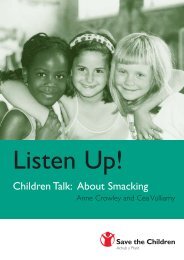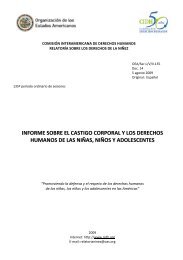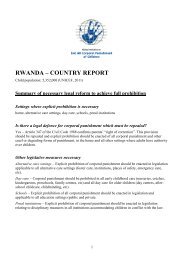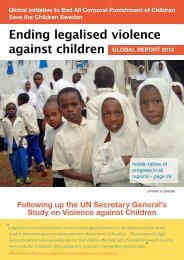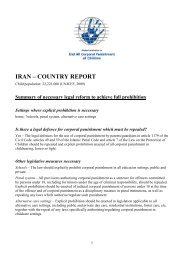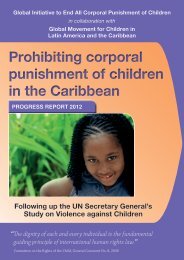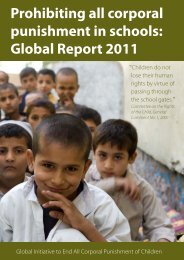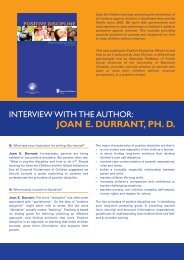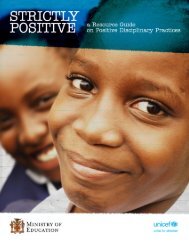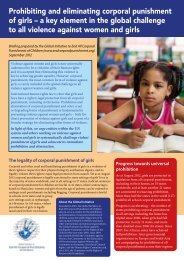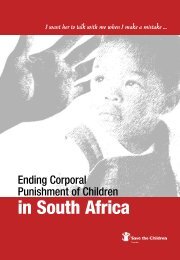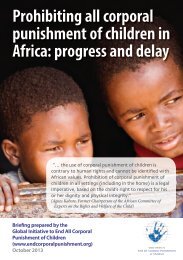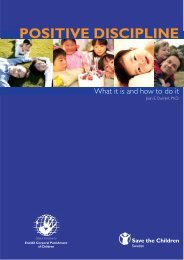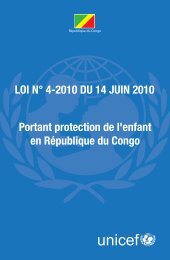Ending corporal punishment of children in Swaziland
Ending corporal punishment of children in Swaziland
Ending corporal punishment of children in Swaziland
- No tags were found...
You also want an ePaper? Increase the reach of your titles
YUMPU automatically turns print PDFs into web optimized ePapers that Google loves.
Awareness-rais<strong>in</strong>g and public educationThe Swazi government should <strong>in</strong>itiate and support public awareness and educationcampaigns to promote positive, non-violent methods <strong>of</strong> child-rear<strong>in</strong>g. This couldbe done <strong>in</strong> close collaboration with NGOs and CBOs work<strong>in</strong>g for <strong>children</strong>’s rights,political and traditional leaders, faith-based organisations, educational <strong>in</strong>stitutionsand <strong>in</strong>ternational donor organisations. Children themselves could play an importantrole <strong>in</strong> these efforts. However, before embark<strong>in</strong>g on awareness and educationcampaigns, the government needs to secure f<strong>in</strong>ancial and human resources toimplement a programme that can be susta<strong>in</strong>ed <strong>in</strong> the long-term. In l<strong>in</strong>e with this,new comprehensive legislation on <strong>children</strong> should spell out the need for therelevant government departments to undertake all reasonable steps to ensure thatpublic education and awareness-rais<strong>in</strong>g on non-violent methods <strong>of</strong> child-rear<strong>in</strong>g areimplemented across the country.In order to ensure that <strong>children</strong> are protected from <strong>corporal</strong> <strong>punishment</strong> <strong>in</strong> schools,the Swazi government needs to allocate f<strong>in</strong>ancial and human resources to developmanuals on how to implement non-violent methods <strong>of</strong> discipl<strong>in</strong>e <strong>in</strong> the classroomand to ensure that teachers receive tra<strong>in</strong><strong>in</strong>g on <strong>children</strong>’s rights and alternatives to<strong>corporal</strong> <strong>punishment</strong>. Tra<strong>in</strong><strong>in</strong>g programmes for law enforcement <strong>of</strong>ficials and other<strong>of</strong>ficials car<strong>in</strong>g for <strong>children</strong> should be implemented.It should be explored how teacher tra<strong>in</strong><strong>in</strong>g <strong>in</strong>stitutions could provide <strong>in</strong>-depthtra<strong>in</strong><strong>in</strong>g on concepts such as <strong>children</strong>’s rights, and ensure extensive tra<strong>in</strong><strong>in</strong>g on howteachers can manage classroom discipl<strong>in</strong>e <strong>in</strong> a positive, non-violent manner.The Swazi government, <strong>children</strong>’s rights organisations and the media shouldstrengthen efforts to create an understand<strong>in</strong>g <strong>of</strong> and respect for <strong>children</strong>’s rights. Itis less likely that adults will use <strong>corporal</strong> <strong>punishment</strong> and other forms <strong>of</strong> humiliat<strong>in</strong>gand degrad<strong>in</strong>g <strong>punishment</strong> <strong>of</strong> <strong>children</strong> <strong>in</strong> a society where the understand<strong>in</strong>g <strong>of</strong> andrespect for <strong>children</strong>’s rights are well developed.MediaThe media could play an important role to raise awareness on <strong>children</strong>’s rights,<strong>in</strong>clud<strong>in</strong>g the rights <strong>of</strong> <strong>children</strong> not to be exposed to <strong>corporal</strong> <strong>punishment</strong> andother forms <strong>of</strong> humiliat<strong>in</strong>g and degrad<strong>in</strong>g <strong>punishment</strong>. It could also become akey partner <strong>in</strong> campaigns to raise awareness on alternative, non-violent forms <strong>of</strong>discipl<strong>in</strong>e. It could play an important role <strong>in</strong> monitor<strong>in</strong>g how the government fulfillsits obligations under the CRC.Children’s participationChildren have the right to be <strong>in</strong>volved <strong>in</strong> processes and decisions that affectthem. Children can provide valuable <strong>in</strong>formation and op<strong>in</strong>ions, which shouldbe taken <strong>in</strong>to consideration when develop<strong>in</strong>g and implement<strong>in</strong>g legislation and<strong>in</strong>terventions to abolish <strong>corporal</strong> <strong>punishment</strong> and other forms <strong>of</strong> humiliat<strong>in</strong>g anddegrad<strong>in</strong>g <strong>punishment</strong> <strong>of</strong> <strong>children</strong>. Children could also play an active part <strong>in</strong> theimplementation <strong>of</strong> these <strong>in</strong>terventions.31



